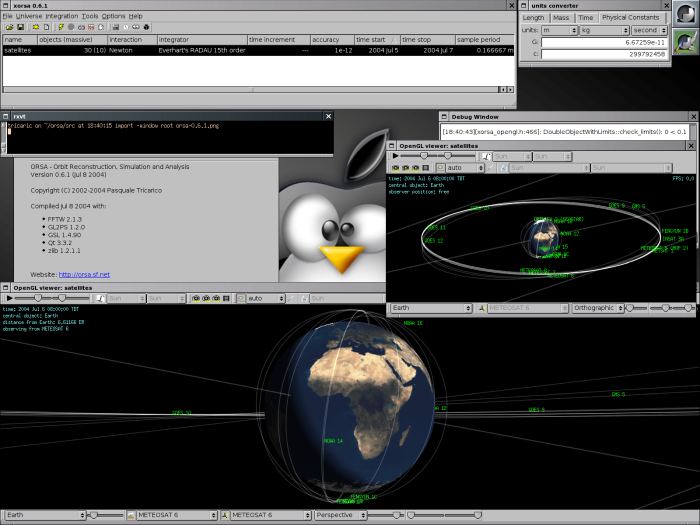Orbit Reconstruction, Simulation and Analysis (ORSA) is a framework for scientific grade Celestial Mechanics computations. The main goals of the project are the implementation of state of the art orbit integration algorithms, with concerns on accuracy and performance, and the development of a number of analysis tools.
Asteroids, comets, artificial satellites, solar and extra-solar planetary systems can be accurately reproduced, simulated, and analyzed.
There’s texture support for all the Solar System planets.
The main goals of the ORSA project are:
- Create a common infrastructure among the existing celestial mechanics programs and standards.
- Use an object oriented programming language (C++), CVS and auto-configuration tools to achieve a good design, rapid development and maintainability.
- Implementation of state of the art orbit integration algorithms, with concerns on accuracy, performance and interaction options.
- Sevelop command-line and graphical applications with 3D capabilities (OpenGL).
- Support for High Throughput Computing systems (i.e. Condor) and GRID.
Features include:
- Accurate numerical algorithms.
- Uses JPL ephemeris files for accurate planets positions.
- Qt-based graphical user interface.
- Advanced 2D plotting tool and 3D OpenGL viewer.
- Import asteroids and comets from all the known databases (MPC, JPL, Lowell, AstDyS, and NEODyS).
- Integrated download tool to update databases.
- Stand alone numerical library liborsa.
- Save and restore session from a single file.
- Many general classes.
- Create simulate universes.
- Multipole Expansion (useful for low-Earth artificial satellites).
- Texture support for all the Solar System planets.
- Tutorial programs.
- Cross-platform support – runs on Linux, Mac OS X, and Windows operating systems.
Website: github.com/AndrewBuck/orsa
Support:
Developer: Pasquale Tricarico and many contributors
License: GNU General Public License v2.0

ORSA is written in C++. Learn C++ with our recommended free books and free tutorials.
Return to Astronomy | Return to Astronomical Data Analysis
| Popular series | |
|---|---|
| The largest compilation of the best free and open source software in the universe. Each article is supplied with a legendary ratings chart helping you to make informed decisions. | |
| Hundreds of in-depth reviews offering our unbiased and expert opinion on software. We offer helpful and impartial information. | |
| The Big List of Active Linux Distros is a large compilation of actively developed Linux distributions. | |
| Replace proprietary software with open source alternatives: Google, Microsoft, Apple, Adobe, IBM, Autodesk, Oracle, Atlassian, Corel, Cisco, Intuit, and SAS. | |
| Awesome Free Linux Games Tools showcases a series of tools that making gaming on Linux a more pleasurable experience. This is a new series. | |
| Machine Learning explores practical applications of machine learning and deep learning from a Linux perspective. We've written reviews of more than 40 self-hosted apps. All are free and open source. | |
| New to Linux? Read our Linux for Starters series. We start right at the basics and teach you everything you need to know to get started with Linux. | |
| Alternatives to popular CLI tools showcases essential tools that are modern replacements for core Linux utilities. | |
| Essential Linux system tools focuses on small, indispensable utilities, useful for system administrators as well as regular users. | |
| Linux utilities to maximise your productivity. Small, indispensable tools, useful for anyone running a Linux machine. | |
| Surveys popular streaming services from a Linux perspective: Amazon Music Unlimited, Myuzi, Spotify, Deezer, Tidal. | |
| Saving Money with Linux looks at how you can reduce your energy bills running Linux. | |
| Home computers became commonplace in the 1980s. Emulate home computers including the Commodore 64, Amiga, Atari ST, ZX81, Amstrad CPC, and ZX Spectrum. | |
| Now and Then examines how promising open source software fared over the years. It can be a bumpy ride. | |
| Linux at Home looks at a range of home activities where Linux can play its part, making the most of our time at home, keeping active and engaged. | |
| Linux Candy reveals the lighter side of Linux. Have some fun and escape from the daily drudgery. | |
| Getting Started with Docker helps you master Docker, a set of platform as a service products that delivers software in packages called containers. | |
| Best Free Android Apps. We showcase free Android apps that are definitely worth downloading. There's a strict eligibility criteria for inclusion in this series. | |
| These best free books accelerate your learning of every programming language. Learn a new language today! | |
| These free tutorials offer the perfect tonic to our free programming books series. | |
| Linux Around The World showcases usergroups that are relevant to Linux enthusiasts. Great ways to meet up with fellow enthusiasts. | |
| Stars and Stripes is an occasional series looking at the impact of Linux in the USA. | |
